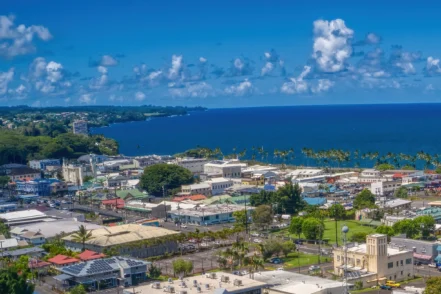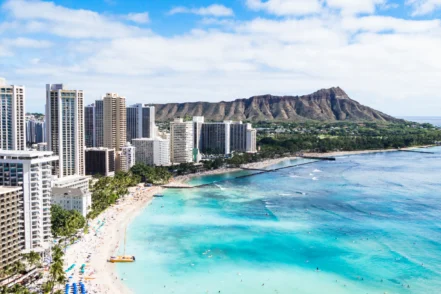All Honolulu Addiction Treatment Centers
-
Ku Aloha Ola Mau Honolulu
1130 North Nimitz Hwy, Suite C-302
Honolulu, Hawaii 96817Treatment Programs
- Alcohol Rehab
- Dual Diagnosis
- Opioid Addiction
- +6
Insurance
- Medicaid
- Private insurance
- +4
-
Action with Aloha Honolulu
200 North Vineyard Boulevard, Suite 501
Honolulu, Hawaii 96813Treatment Programs
- Alcohol Rehab
- Dual Diagnosis
- Opioid Addiction
- +4
Insurance
- Medicaid
- Private insurance
- +6
-
Aloha Psychological Services
1133 Waimanu St, Suite 2103
Honolulu, Hawaii 96816Treatment Programs
- Alcohol Rehab
- Dual Diagnosis
- Opioid Addiction
- +4
Insurance
- Self-pay options
-
Army Substance Abuse Program ASAP Honolulu
344 Heard Street, Building 556
Honolulu, Hawaii 96857Treatment Programs
- Drug Rehab
-
CARE Hawaii Honolulu
875 Waimanu Street, Suite 600
Honolulu, Hawaii 96813Treatment Programs
- Alcohol Rehab
- Dual Diagnosis
- Opioid Addiction
- +5
Insurance
- Medicaid
- Private insurance
- +3
-
Hina Mauka Teen Care W Radford High School
4361 Salt Lake Boulevard
Honolulu, Hawaii 96818Treatment Programs
- Alcohol Rehab
- Drug Rehab
- Mens Rehab
- +2
Insurance
- Free
-
Hope
1545 Linapuni Street, Suite B105
Honolulu, Hawaii 96819Treatment Programs
- Alcohol Rehab
- Dual Diagnosis
- Adult Program
- +3
Insurance
- Medicaid
- Private insurance
- +5
-
Kalihi Palama Community Mental Health Center
1700 Lanakila Avenue
Honolulu, Hawaii 96817Treatment Programs
- Dual Diagnosis
- Adult Program
- Senior Rehab
- +1
Insurance
- Medicaid
- Private insurance
- +3
-
O ahu First Circuit Drug Court
777 Punchbowl Street
Honolulu, Hawaii 96813Treatment Programs
- Alcohol Rehab
- Dual Diagnosis
- Opioid Addiction
- +5
Insurance
- Self-pay options
- Financing available
- +1
-
Office of Youth Center OYC
707 Richards Street
Honolulu, Hawaii 96813Treatment Programs
- Alcohol Rehab
- Dual Diagnosis
- Opioid Addiction
- +3
Insurance
- Medicaid
- Medicare
-
Oxford House Kalihi Valley
1624 Violet Street, Unit A
Honolulu, Hawaii 96819Treatment Programs
- Alcohol Rehab
- Dual Diagnosis
- Opioid Addiction
- +3
Insurance
- Self-pay options
-
Sand Island Treatment
1240 Sand Island Parkway
Honolulu, Hawaii 96819Treatment Programs
- Alcohol Rehab
- Dual Diagnosis
- Adult Program
- +3
Insurance
- Medicaid
- Private insurance
- +4
-
Teen Challenge Oahu Christian Life School
1146 Elm Street, Suite A
Honolulu, Hawaii 96814Treatment Programs
- Alcohol Rehab
- Opioid Addiction
- Drug Rehab
- +3
Insurance
- Self-pay options
- Medicaid
- +2
-
Aiea Medical Building
99-128 Aiea Heights Drive
Aiea, Hawaii 96701Treatment Programs
- Dual Diagnosis
- Young Adult Rehab
- Adult Program
- +3
Insurance
- Medicaid
- Private insurance
- +4
-
Hina Mauka Pookela Street
45-845 Pookela Street
Kaneohe, Hawaii 96744Treatment Programs
- Alcohol Rehab
- Dual Diagnosis
- Opioid Addiction
- +5
Insurance
- Medicaid
- Private insurance
- +2
Other Nearby Cities
Top Drug Rehab Centers in Hawaii
-
 Hawaii
HawaiiHope Services Hawaii
357 Waianuenue Avenue Hilo, Hawaii 96720
Treatment Programs
- Alcohol Rehab
- Dual Diagnosis
- Opioid Addiction
- +3
-
 Hawaii
HawaiiHawaii Island Recovery
75-170 Hualalai Road, Suite C 311-A Kailua-Kona, Hawaii 96740
Treatment Programs
- Alcohol Rehab
- Dual Diagnosis
- Opioid Addiction
- +4
-
 Hawaii
HawaiiThe Exclusive Hawaii Hakalau
31-631 Old Mamalahoa Hwy Hakalau, Hawaii 96710
Treatment Programs
- Alcohol Rehab
- Dual Diagnosis
- Opioid Addiction
- +4
-
 Hawaii
HawaiiThe Ohana Addiction Treatment Center
75-5915 Walua Road Kailua-Kona, Hawaii 96740
Treatment Programs
- Drug Rehab
- +-2
-
 Hawaii
HawaiiBig Island Substance Abuse Council 297 Waianuenue Avenue
297 Waianuenue Avenue Hilo, Hawaii 96720
Treatment Programs
- Alcohol Rehab
- Dual Diagnosis
- Opioid Addiction
- +4
-
 Hawaii
HawaiiHabilitat Kaneohe
45-035 Kuhonu Place Kaneohe, Hawaii 96744
Treatment Programs
- Alcohol Rehab
- Opioid Addiction
- Drug Rehab
- +4
-
 Hawaii
HawaiiKu Aloha Ola Mau Honolulu
1130 North Nimitz Hwy, Suite C-302 Honolulu, Hawaii 96817
Treatment Programs
- Alcohol Rehab
- Dual Diagnosis
- Opioid Addiction
- +6
-
 Hawaii
HawaiiHoomau Ke Ola
85-761 Farrington Highway, Suite 101 Waianae, Hawaii 96792
Treatment Programs
- Alcohol Rehab
- Dual Diagnosis
- Opioid Addiction
- +6
-
 Hawaii
HawaiiLokahi Treatment Center Hilo
400 Hualani Street, Building 10-195-B Hilo, Hawaii 96720
Treatment Programs
- Alcohol Rehab
- Drug Rehab
- Young Adult Rehab
- +3
-
 Hawaii
HawaiiBobby Benson Center
56-660 Kamehameha Highway Kahuku, Hawaii 96731
Treatment Programs
- Alcohol Rehab
- Dual Diagnosis
- Opioid Addiction
- +5
